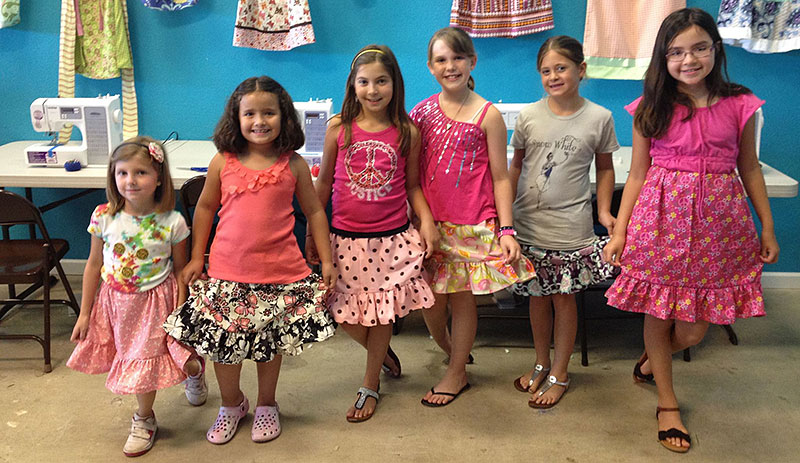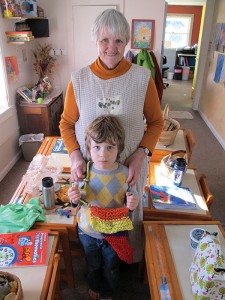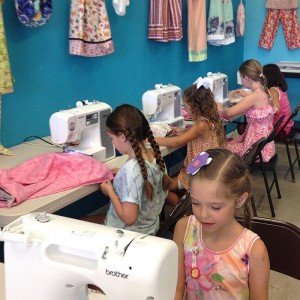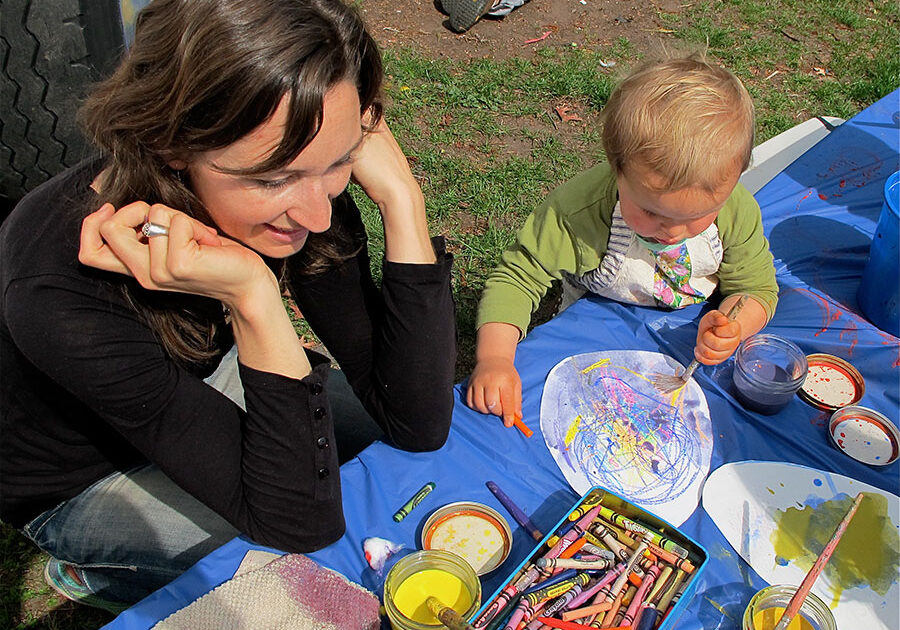Knitting, crocheting and sewing. While the mention of these crafts may conjure up rocking chairs on porches and grey-haired buns, many in the grade-school set across the North State are picking up knitting needles … and learning more than just knitting in the process.
Lots of homeschooling families are doing handiwork. So is every Waldorf school world-wide, including Chico’s Blue Oak School, along with plenty of innovative public and charter schools outside the Waldorf curriculum – and for good reason.
The Waldorf pedagogy, developed by Rudolf Steiner in the early twentieth century, incorporates a variety of what Waldorf calls “handworks” at specific ages, beginning with stitching in kindergarten, and knitting, crocheting and cross-stitching in the lower grades. “Fine motor skills and eye-hand coordination are two of the most important reasons for children to do handwork,” says Donica O’Laughlin, a volunteer handworks instructor at Blue Oak.
O’Laughlin cites a number of additional benefits: “By doing motor-skill activities like crocheting, children actually create a product at the end; they don’t think they’re just practicing.” It’s a cooperative project in some respects, as older children help the younger ones. “They develop patience and they help each other,” O’Laughlin says. “It develops self-esteem for the children who become the teachers.”
“Primary school children are leaving early childhood and entering a new phase of development,” explains Carol Fegte, a Waldorf teacher who teaches knitting and crocheting to first and third graders in Chico, in a homeschool tutoring center she calls The Little School. “When a child’s brain is still developing, knitting is one of the activities a child can do to assist the brain’s development,” she adds. “By doing activities that cross back and forth from the left side of the body to the right, a child’s brain is prepared for learning other fine and gross motor skills.”
Many schools cannot offer regular instruction in handiwork, not just because of funding issues, but because teachers often don’t have the skills to teach knitting or sewing. However, individual teachers at Durham Elementary, Wildflower Open Classroom, and Thrive Learning Center do have those skills, and have brought them into the classroom, recognizing their usefulness for students.
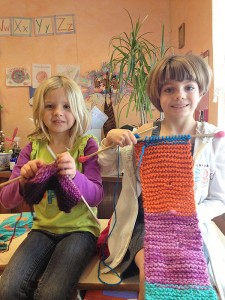 Elsewhere, students have to look outside the classroom for that knowledge. According to many businesses offering sewing, knitting and crocheting instruction to children in the North State, the popularity of these handiwork skills as an after-school hobby is surging. Renee Noel opened the Fabulous Fabric Shop in Redding almost three years ago, intending on focusing on fabrics, but the classes offered for young sewers of ages 6 and up, like her after-school sewing camps, surprised her with their popularity.
Elsewhere, students have to look outside the classroom for that knowledge. According to many businesses offering sewing, knitting and crocheting instruction to children in the North State, the popularity of these handiwork skills as an after-school hobby is surging. Renee Noel opened the Fabulous Fabric Shop in Redding almost three years ago, intending on focusing on fabrics, but the classes offered for young sewers of ages 6 and up, like her after-school sewing camps, surprised her with their popularity.
“The classes have kind of taken off and it’s become the core of our business now. I didn’t plan it that way, but the popularity kind of took over,” explains Noel. Soon after starting the classes, she had a long waiting list. Now she’s adding crocheting classes – and parents have noticed a difference in their children.
“The feedback that I’ve gotten from the parents is that the classes have been a huge confidence booster – for the girls, mostly. You can see their self-esteem rise in front of you as they proudly hold up their projects for their parents to see! All the girls that make their own clothes wear them to school,” says Noel. She adds, smiling, “It also gets their creative juices flowing – they go home and start designing things on their own.”
Noel believes the poor economy has inspired people to “get back to the basics with sewing and crafting hobbies.” “People feel like they are saving money by making their own items, and it’s a cheap hobby to do at home versus spending money on other activities,” she explains. “As far as the kids, they want to be creative and be fashion designers, like on ‘Project Runway.’”
Throughout the North State, newcomers like the Fabulous Fabric Shop offer classes alongside youth organizations like 4-H and Frontier Girls, which also offer sewing & handiwork classes. Even the Shasta Public Library has a knitting group for all ages, which meets every third Sunday.
“We noticed some other library systems were doing knitting programs,” said Megan Owens, Outreach Coordinator for the library. With a knitter on staff, they decided to provide the open group as a community builder. They have potholder weaving boards on hand for children who have yet to learn to knit, along with donated needles and balls of yarn.
Many charter schools supporting homeschooling families in the North State offer a range of handiwork skills. Stacie Beadel, who homeschools her own children, teaches sewing to homeschoolers from CORE Butte Charter School as an instructional vendor. “It’s fun to sit around the table together, and then walk away with a project that’s been made,” Beadel says of her sewing classes. “I want them to make things that are useful.” She gives the students the freedom to create, saying, “It was your idea – you did it!,” from choosing materials and patterns, to finishing the project.
“I love the artistic side of creating; you get to express the design in your head and make the real thing,” Beadel says. For children who struggle with math, “we draft our own patterns. It takes math skills to be able to do that!” she exclaims.
Dorothy Vosse, owner of Earth Girl Art, an art center in Chico offering sewing classes, agrees. Sewing teaches “critical thinking and problem solving,” said Vosse. “When you’re doing a pattern for sewing, you need to maneuver each of the pattern pieces so that they fit. You’re learning fractions, and how to problem solve … there are some really good skills that go along with that, and they’re applicable skills, too.”
“These skills seem to have skipped a generation – their moms didn’t learn to sew, but their grandmas did,” says Noel of her young students in her sewing classes. “Now that their kids are getting into it, their parents are enrolling in my adult classes!” And so traditional skills are being kept alive for this and future generations.
Posted in: Art & Music
Comment Policy: All viewpoints are welcome, but comments should remain relevant. Personal attacks, profanity, and aggressive behavior are not allowed. No spam, advertising, or promoting of products/services. Please, only use your real name and limit the amount of links submitted in your comment.
You Might Also Like...

Celebrating Twenty Years of Missoula Children’s Theatre in Red Bluff
Early spring in Red Bluff is a time when kids can truly feel like kids. All other “mature” commitments are tossed to the winds for around 60 local kids when […]

Little Elves Workshop: A Joyous Family Holiday Tradition
Fragrant holiday wreaths, handmade holiday ornaments, craft tables laden with crafting supplies and projects and staffed by friendly elves, holiday music and entertainment, hot apple cider and seasonal treats – […]

Lovenotes – Unique Prenatal Music Class Presented By The Children’s Choir Of Chico
Beginning in January 2012, The Children’s Choir of Chico will offer a new prenatal music class called Lovenotes™. Developed by Kodály Educator Sister Lorna Zemke, and designed to promote bonding […]
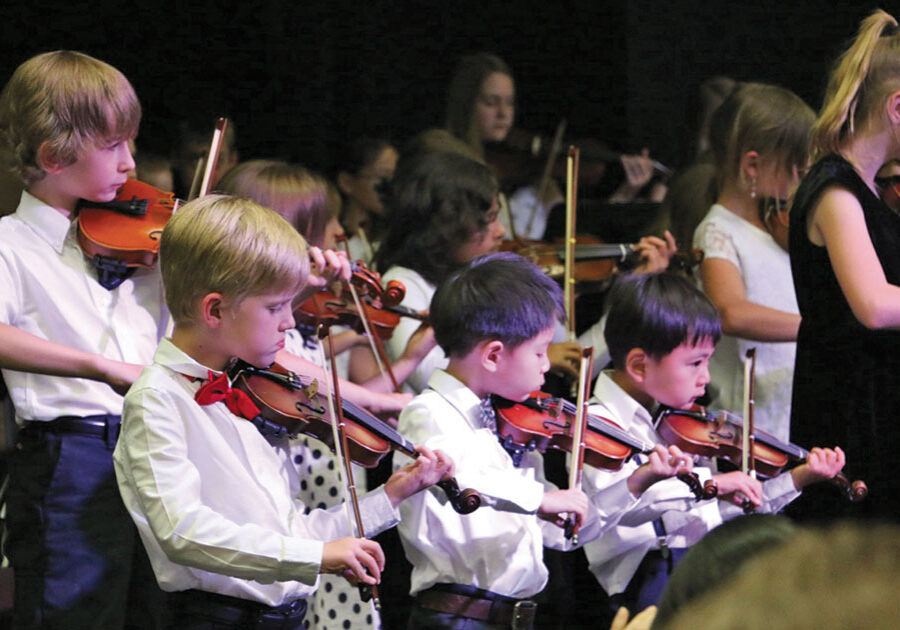
Strings in Schools – Violin, Flute and Kindermusik in the North State
Violins come in eight sizes, the smallest size merely 14.5 inches in length from scroll to end button. This adorable instrument fits snugly into the arm span of very young […]


